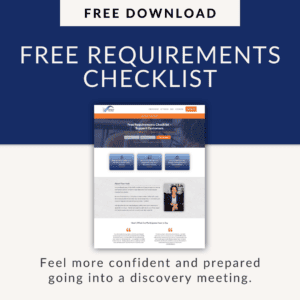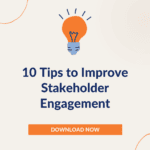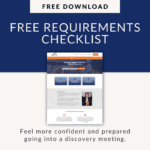Are you working with new stakeholders in a new company or project? As a business analyst, building rapport with critical stakeholders is one of the best ways to get a new project started effectively and set yourself up for success.
It’s a built-in insurance policy against future project mishaps and challenges.
In this short video, you’ll learn Laura’s top three tips for building rapport with critical stakeholders that you can begin implementing today.
In tip #2, Laura shares the importance of actively understanding the different perspective and communication styles of the stakeholders. In order to do that, you need to ask well-crafted questions and actively engage in the conversation.

Hi, I’m Laura Brandenburg with Bridging the Gap where we help you start, succeed, and excel in your business analyst career. With weekly videos on business analyst tips and techniques. So let’s dive right in here, though, for these three tips on building rapport.
Building Rapport Tip #1 – Introduce Yourself
First things first is to introduce yourself. Depending on the environment, this could be via email, over the phone, on a Zoom call or in an in-person meeting. Be warm and bring your best self. If in person, shake hands. If on Zoom, use your body language to say a true hello. And smile and make eye contact. Be really fully present with the other person.
You can start by asking a few general questions such as how long have they been with the company? Or if there’s an object in their office or their Zoom background, you could ask about that. Maybe there’s a picture or a trinket or a book that you could comment on.
You can also share something about yourself that feels both professional and relevant. This can be a conversation. It’s not just an interview. You want to open up to them as much as you’re asking them to open up to you. It can feel intimidating to be meeting new people, especially if they’re a critical stakeholder who may hold a higher level role within the company. I find it’s so helpful to remember that at the end of the day, we are all human beings in physical bodies living here on planet Earth. The more confident you feel in your business analysis skillset and your ability to bring unique value to the project, the easier it will be for you to shift out of this feeling of being intimidated and nervous and meet any stakeholder in your own power.
Remember, you don’t need to have all the answers, but you do need to be the one who’s asking the right questions and analyzing the information that you receive as a result.
Building Rapport Tip #2 – Actively Understand Their Perspective and Communication Style
That brings us to tip two, which is actively understanding their perspective. In reality, even the most critical, high level stakeholder that you can imagine have their own concerns. Again, they’re a human being. They may even have insecurities about their role about the project. They might not know what a business analyst does. They may have doubts about the team that’s in place and their ability to execute on the project or what that project is even supposed to do.
After an introduction, in that warm greeting, shift the conversation to the project. Share what information you have so far in a very brief and succinct way, and then ask a few questions about their perspectives. Questions could include what concerns do they have. What are they really, really hoping to accomplish? What would this project mean to their team, to them personally, to the goals for the team or the goals for the organization? Who else should you be getting involved and what roles would they want to play?
As you are listening, reflect back what you are hearing so that they can see and really experience that you’re understanding them and not just letting the information wash over you. And if it’s not clear, this is super important, ask questions. You do not build rapport by nodding your head or letting the information just sort of wash by you.

As you get to know the stakeholder, you also want to ask questions about their preferred communication style and what they would like to know about. Do they want regular email updates, a weekly status call, or chat messages? Do your best, within reason, to accommodate their preferred communication style. It’ll go a long, long way.
Building Rapport Tip #3 -Do What You Say You Are Going To Do
This brings us to tip three, which is to do what you say you are going to do. Start with something small in your first meeting if you can, such as I’ll follow up and send notes, or I’d love to share an article that’s relevant to this discussion, and then do it. It almost doesn’t matter what it is, but make a conscious commitment to them in the meeting and then take that as a next step. Let them know when you’ll complete it by as well. And follow through. It starts to build that trust. This is the person who does what they say they are going to do. They start to believe that they can count on you.
As the project unfolds, obviously stay steadfastly true to your commitments when it comes to your requirements, your meetings, your deadlines, the issues that you’re taking ownership of. All of that really builds trust.
And, of course, there’s going to be circumstances when you run into unexpected roadblocks or you can’t follow through on something you committed to for some. What’s important in the context of building rapport is that you communicate this ahead of time. Where it’s appropriate actually involve them in making decisions about how those issues are handled.
Leverage Your Rapport
Now, this all might feel like an investment, but really these are tips that you can apply as you were going through the work that you’d be doing anyway as a business analyst. It’s not something that has to be above and beyond. These are tips you can sprinkle into the interactions that you’re probably already having. The important thing is the rapport that you build with stakeholders pays dividends all through the course of the project. When they know you and trust you, they will show up for you. They will help resolve roadblocks, and they will partner with you when you are going through challenges. They will share information more readily and your project will move more smoothly.

>>Free Requirements Checklist<<
Also, I want you to check out this next video on asking good questions during requirements elicitation that you can learn exactly how to implement this checklist for your next project. I’ll see you over there.

Hi Zibi, this is a great question and one that I am struggling with currently. We have a team member who sees the project and each situation in a completely different way than we do. If we say black, he says white – even to the point of not being truthful. It is so frustrating because I have lost the trust for this person. And respect – well you need to earn that and if you are telling me something that is completely different than you have told to another team member – who do I trust and respect?
I do a lot of observing my stakeholders when I interact with them. I was in a late meeting today and I just watched their reactions, their facial expressions and their body language. I felt that I could tell how they were feeling through this. I also found that they looked to me for answers when they needed guidance. This tells me that I have their trust. I have always been honest with them, I always follow through – so if I say I will do something, I do it, I arrive at meetings happy, I am helpful and offer suggestions and I know their business. It took a lot for this particular group to work together and I believe they are where I want them to be and through that I know that they respect and trust me too.
The best suggestion I can offer is to be honest, work with integrity and follow through and I know you will be great!
Hi Michelle, I love your article, could you plaese give me advice; how you go about to ensure, that you trust and respect your stakeholders and that they respect and trast you?
Hi Akarsh, thank you very much for your positive words. Happy to hear that you work the same way and are very successful!
Michelle
@Michelle,
Great article! Enjoyed reading the post; agreed with you building relationships with stakeholders is an important factor for BA/Consultants.
I follow similar steps like you When I talk with the stakeholders on each successive meeting usually i do not get started on with work/tasks; meeting starts of general tasks about his day, his work, sports etc. totally based on situation as i have known my stakeholder for couple of years now.
Also there are times we end up talking about how he approaches his customers on business deals as this has helped me to provide him new set of ideas for the projects this in-turn has led for incremental revenue for us and for my stakeholder i have provided him idea to store data as centralized repository for him and his team.
All this possible only after i have met initial timelines and deadlines and proved him about my capabilities.
Thanks again for posting the article!!
Pingback: Weekly Wrap Up: Building Trusting Relationships, Soft Skill Traits, and Having Varied Experiences | Real World BA™
Wow, thank you Adrian, Karie and Jack, I truly appreciate your feedback and comments and suggestions. Since writing this article I have been even more aware of the relationships that I build in the company. I find that I am privy to information before others, that people take me into their confidence and that I too find out about potential projects. It just shows how important communication and relationships are to everyone, not just BAs.
Great article. Building and sustaining the relationship with stakeholders is crucial to a BA’s effectiveness. Mainitaining the contact through effective commubication helps overcome the periods of absense/visibility that a consultant may have during various phases of the project. It also enhances your crdibiloty with the stakeholders.
Michelle, I totally agree that this is such an important element to a BA’s success. I have experienced similar success by taking the time to really know and understand the business need and building strong relationships. And Adrian offers some great additional advice. Even things as simple as walking around to say Hi and just “check in” to see how your stakeholders are doing goes a long way.
Building consistent relationships with key users also means that I learn things before they are official projects, which also gives me the opportunity be involved in early discussions when IT might not otherwise have been engaged.
I’m a firm believer in the power of communication to build the trusting relationships that will bring trust and opportunity.
Thank you for reminding all of us how important it is to invest the time to really truly engage with our stakeholders.
Hi Michelle,
Great article! I completely agree with you that building and maintaining relationships is an important part of a BA or consultant’s role. I always find that having the right people involved at the right times makes a project run much more smoothly, and it’s important to take time to build on those relationships.
I find a great way of building and maintaining relationships is simply to keep people informed, and to spend time talking about what is important to them (e.g. “What are you currently working on?”, “What is the most pressing issue in your business right now?”. As analysts, we are sometimes seen as people who appear for a period of time, and then disappear (never to be seen again until the next project!). I find that maintaining contact throughout and between projects is a great way of building credibility. It’s also a great way of getting to know the business priorities, which can be useful for future projects, and a great way of engaging stakeholders and letting them know about the value of the BA role.
Thanks again for posting the article – very thought provoking!
Pingback: Tweets that mention Building critical stakeholder relationships…starting a new engagement off right. -- Topsy.com